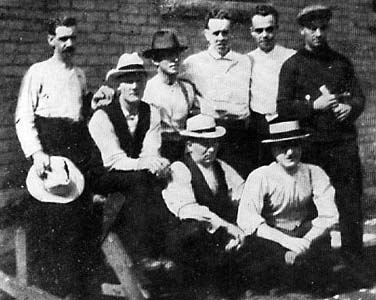Search | Image Archive | Reference | Communities | POV | Lesson Plans | Credits
 Bob Russell came to Canada from Scotland in 1911 as an apprenticed machinist. On coming to Winnipeg, his specialized skills helped him to find a place working at the Canadian Pacific Railway's Weston Shops.
Bob Russell came to Canada from Scotland in 1911 as an apprenticed machinist. On coming to Winnipeg, his specialized skills helped him to find a place working at the Canadian Pacific Railway's Weston Shops.
Russell, like many other skilled workers of his time, was incensed by his employer's efforts, through the application of "scientific management" and other new techniques and technologies, to devalue the skills that he had spent several years in apprenticeship to learn. He helped to organize workers in the International Association of Machinists to fight collectively for better working conditions, more control over their work, and better wages.
Russell, was a staunch socialist and a member of the Socialist Party of Canada (S.P.C.). In the spring of 1919, he attended the Western Labour Conference in Calgary as an S.P.ca delegate. The conference called for the abandonment of discriminatory craft unionism, where highly skilled workers excluded those with lesser skills from their associations, and the creation of the One Big Union (O.B.U.), an industrial union that was to bring together the strength of all workers and employ a new tool in labour negotiations - the general sympathetic strike.
Russell had been one of the most outspoken advocates of the industrial union model at Calgary, and he was deeply involved in organizing for the O.B.U. in the summer of 1919 when the Winnipeg General Strike began. A charismatic leader with a national reputation and many connections in the working class neighbourhoods of Winnipeg, he became a prominent leader of the Central Strike Committee which all but governed Winnipeg during the Strike.
It was for this prominent role that Bob Russell was one of eight strike leaders arrested on the morning of June 17 and charged with conspiracy to overthrow the government. The seven other men who were arrested were George Armstrong, R. E. Bray, A. A. Heaps, William Ivens, R. J. Johns, William Pritchard and John Queen. Most, like Russell, were prominent working class leaders in the local labour and socialist organizations.
Russell received a two year term in Stony Mountain Federal Penitentiary for his activities during the General Strike, but the sentence was suspended after one year. After his release, Russell continued to serve as an organizer for the O.B.U. and remained an outspoken and respected leader in the Western Canadian labour movement.
Page revised: 29 August 2009